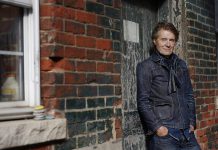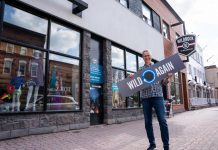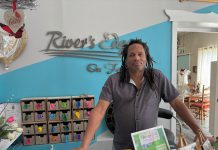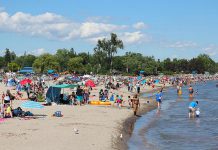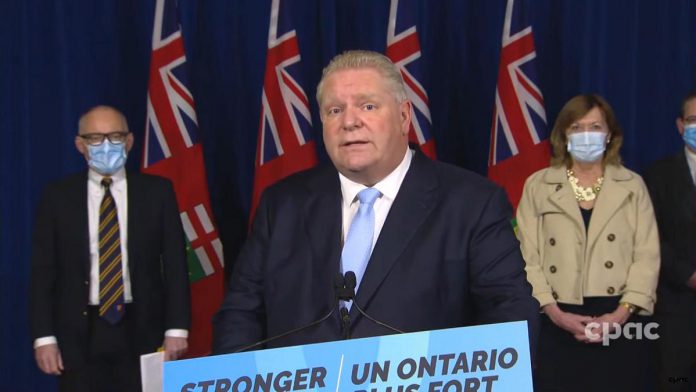
Ontario will be removing capacity limits on most indoor settings this week and will be removing remaining capacity limits, along with proof of vaccination requirements, at the beginning of March.
Premier Doug Ford made the announcement on Monday morning (February 14) at a media conference at Queen’s Park in Toronto, along with health minister Christine Elliott and Ontario’s chief medical officer of health Dr. Kieran Moore.
Ford said the government will “fast track” its reopening plan as positivity rates have fallen and new admissions to hospitals and intensive care units have continued to decline week over week, indicating the omicron wave has peaked.
“Over the weekend, I received recommendations from Dr. Moore on a plan to safely reopen our economy and remove Ontario’s vaccine passport system,” Ford said. “I’ve accepted these recommendations.”
Beginning on Thursday (February 17), all capacity limits will be removed on indoor settings — including restaurants, bars, cinemas, gyms, meeting and event spaces, and casinos, bingo halls, and other gaming establishments — except for sporting events, concert venues, and theatres, which will remain at 50 per cent until March 1. Capacity limits at nightclubs, restaurants where there is dancing, as well as bathhouses and sex clubs, will increase to 25 per cent.
Social gathering limits increase to 50 people indoors and 100 people outdoors, and limits on organized public event will be increased 50 people indoors, with no limit outdoors. Capacity limits for indoor weddings, funerals, and religious services will increase to the number of people who can maintain two metres physical distance.
On Tuesday, March 1, capacity limits in all remaining indoor public settings will be lifted, and proof of vaccination requirements for all settings will also be lifted (although businesses and other settings can choose to continue to require proof of vaccination).
“We are now down the slope from the peak of omicron activity,” Dr. Moore said, adding 92 per cent of Ontarians 12 and old have received at least two doses and 6.7 million Ontarians have received three doses. “We no longer need the proof of vaccination. It served its purpose.”
However, masking requirements in indoor settings will remain in place for the time being.
“Based on the advice of Dr. Moore, and what we have learned over the pandemic, we will need to keep masking in place for just a little bit longer,” Ford said. “This is an important layer of protection that will allow us to proceed with our reopening plan safety.”
In addition, as of 8 a.m. on Friday (February 18), Ontario is expanding booster dose eligibility to youth aged 12 to 17. Appointments can be booked through the provincial booking system and the Provincial Vaccine Contact Centre, as well as at select pharmacies administering the Pfizer vaccine. Appointments will be booked for approximately six months (168 days) after a second dose. To book an appointment online, youth must be 12 years old at the time of appointment.
Monday’s announcement comes three days after Ford declared a state of emergency in the province in response to truck convoy protestors occupying the city of Ottawa and blockading the border crossing in Windsor, including enacting emergency orders to protect critical infrastructure with non-compliance resulting in maximum fines of $100,000 and up to a year in jail.
Before declaring the state of emergency on Friday, Ford said the province is “on track” to remove almost all remaining public health restrictions, including removing the vaccine passport system — one of the demands of those occupying Ottawa and blockading border crossings.
“Let me be very clear, we’re moving in this direction because it’s safe to do so.” Ford said on Monday. “Today’s announcement is not because of what’s happening in Ottawa or Windsor, but despite it. On Friday morning, I made the difficult decision to declare a state of emergency in Ontario. The police now have every single tool they need, they have every resource available to them, and we’ve made progress since speaking with you last time.”
While police cleared the blockade at the Ambassador Bridge in Windsor over the weekend, the truck convoy protest in Ottawa is now into its third week. Over the weekend, Ottawa residents held two counter-protests, with around 500 people marching from Lansdowne Park through the Glebe on Saturday, and around 1,000 people gathering at Bank Street and Riverside Drive on Sunday.
“While Ottawa remains a more complex situation, involving municipal, provincial, and federal law enforcement, all three levels of government are focused on ending the illegal occupation,” Ford said.
“To those who are still there, to those of you who are there with the sole objective of causing disruption and chaos, there’ll be serious consequences for this lawless activity,” Ford said. “We will continue to raise the consequences against those who are holding millions of jobs and people hostage.”
Ford said a number of vehicles were seized over the weekend in Ottawa, and those seizures will continue.
“If you choose to use your vehicle to create chaos, you will lose that vehicle and your licence, plain and simple,” he added.
After thanking police officers for their efforts, Ford acknowledged the pandemic “has been one of the most divisive times in our history.”
“One of the hardest things about this pandemic is the way it’s fractured us as a society,” he said. “Differing views about government policies, the limits of personal freedoms, different views about vaccines, public health measures, and what steps are necessary. All of it has polarized us in a way that we could have never imagined.”
“I’ve experienced this in my own family,” he added. “It’s been one of the hardest things my family and I have ever gone through.”
“I take comfort in known that this awful pandemic will soon be behind us. As hard as this period has been, time will heal this pain and we will come out on the other end of this ordeal stronger, more resilient, and more united as Canadians.
The original version of this story has been expanded with additional details from Monday’s media conference.











